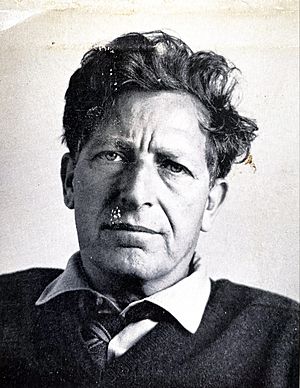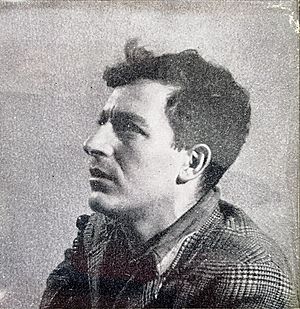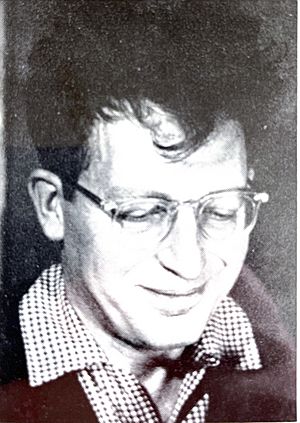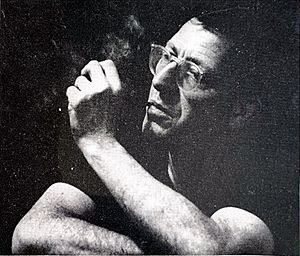Paul Goodman facts for kids
Quick facts for kids
Paul Goodman
|
|
|---|---|

Goodman, 1969
|
|
| Born | September 9, 1911 New York City, US
|
| Died | August 2, 1972 (aged 60) New Hampshire, US
|
| Alma mater | City College of New York (AB) University of Chicago (PhD) |
| Occupation | Writer, teacher |
| Years active | 1941–1972 |
| Known for | Social criticism, fiction |
|
Notable work
|
Growing Up Absurd, Communitas, Gestalt Therapy |
Paul Goodman (1911–1972) was an American writer and thinker. He was well-known for his writings in the 1960s. These works often looked at how society worked and how people fit into it.
Goodman wrote about many different topics. These included art, fairness for all people, and how cities are planned. He also wrote about education, technology, and peace. He believed that each person had a duty to be creative and to think for themselves.
Contents
Discovering Paul Goodman's Life
Paul Goodman was born in New York City on September 9, 1911. His family had moved to New York from Germany a long time ago. His father left the family before Paul was born. Paul was raised by his aunts and older sister.
He went to public schools in New York City. He was very good at literature and languages. In 1927, he graduated at the top of his class. He then went to City College of New York. There, he studied philosophy and made lifelong friends. Goodman became interested in anarchism during college. He kept this belief throughout his life. He finished his bachelor's degree in 1931.
Early Writing and Teaching Years
Goodman wanted to be a writer. He wrote and published poems, essays, and stories. He also wrote a play. He did not have a regular job. He read movie scripts and taught drama in the summers.
He later went to the University of Chicago for graduate school. He studied literature and philosophy. He was a student and a part-time teacher there. He left the university in 1940.
Goodman returned to New York City to write. He published his first book of poetry in 1941. His first novel came out in 1942. He taught at a progressive boarding school for a short time. He was let go from this job. He also faced challenges because of his personal life and his views on military service during World War II.
Goodman became a strong supporter of peace. He also believed in local control and smaller communities. He wrote for journals that supported these ideas. His essays from this time shaped his later writings about society.
Exploring New Ideas: Gestalt Therapy
In the late 1940s, Goodman started exploring new fields. These included therapy and city planning. He began a long-term relationship in 1945. His family lived with very little money. His wife's salary was their main income. Goodman also taught at night school and during a summer program.
Goodman became involved in a type of therapy called Gestalt therapy. He worked with Fritz Perls and Laura Perls to develop its ideas. Goodman wrote the main theory chapter for their book, Gestalt Therapy (1951). He also started his own therapy practice in the early 1950s. He helped people and led group sessions.
During this time, Goodman still saw himself as an artist. He wrote many books and stories. He received his Ph.D. in 1954. His writings brought him little money or fame at first. This was a difficult time for him.
He traveled to Europe in 1958. There, he thought deeply about problems in America. He decided to write about these issues in a way that would help improve his country. He wanted to reach more people with his ideas.
Paul Goodman's Social Criticism
In 1960, Goodman published Growing Up Absurd. This book looked at why young people in America felt lost and unhappy. It made him a very important thinker. The book helped young people understand their feelings. It said they were right to feel upset about a society that lacked meaning.
Goodman suggested new ways of doing things. He wrote about family, school, and work. He also covered media, politics, and how to live a better life. He believed in simple, traditional values like honor and faith. He thought these could help create a more meaningful society.
Young people liked Goodman's honest ideas. They saw him as a guide for living freely in a complex world. He often spoke at colleges. He talked with students about how to make changes. He encouraged youth movements like Students for a Democratic Society. He became known as "the philosopher of the New Left".
Goodman started to reach many more people. Publishers reissued his old books and printed his new writings. He published at least one book every year for the rest of his life. These included books on education, decentralization, and his own life story. His ideas influenced movements for new, flexible schools.
Goodman also taught at several universities. He was a visiting scholar and a professor. He took part in protests against war and military service in the 1960s. His son was also active in these protests. Sadly, his son died in a mountaineering accident in 1967. This caused Goodman deep sadness.
Towards the end of the 1960s, some groups criticized Goodman. They felt his ideas were not revolutionary enough. Goodman continued to write. His health got worse due to a heart condition. He died of a heart attack in New Hampshire on August 2, 1972, at age 60.
Goodman's Ideas and Impact
Goodman believed that humans are naturally creative and caring. He thought that society's rules sometimes stop people from being their true selves. He wrote about many topics. These included art, city planning, and civil rights. He also wrote about democracy, education, and peace.
He believed that everything in society was everyone's business. He shared many ideas for making society better. He often gave lectures and wrote articles.
Politics and Society
Goodman was most famous for his political ideas. He encouraged young people to take action. He believed in local control and smaller groups. He thought that power should be spread out to prevent harm. He said that "anarchists want to increase intrinsic functioning and diminish extrinsic power."
He believed that small, everyday things were most important. He did not like big plans to change the world. Instead, he wanted smaller, community-based groups. These groups could better meet people's needs. He thought that too much central power made people feel helpless.
Goodman believed that people should be free to start new ideas and projects. He thought this was important for communities to grow. He also believed that individual effort and friendly competition helped communities thrive.
He was influenced by thinkers like Immanuel Kant. Goodman believed in people's ability to act on their own ideas. He also believed in self-improvement by taking part in society. He liked American ideas of freedom and local democracy. He focused on American radical thinkers.
Education for a Better World
Goodman's ideas on education came from his interest in new ways of teaching. He also learned from student movements.
He believed that education should help people become fully human. It should also help create a "worthwhile" world. He thought that natural human development and education were the same thing. He said that "mis-education" was like brainwashing. It taught people to ignore their own feelings and experiences.
Goodman believed that if society didn't offer good chances, education couldn't happen. He thought that a lack of community and purpose made young people feel hopeless.
He suggested replacing required schooling with different ways of learning. These could be more specific to what each person was interested in. He even thought people should have the choice not to go to school at all. He believed in breaking down large schools into smaller groups.
Goodman's books on education were among the first to criticize public schools in the 1960s. His ideas influenced many later thinkers about education.
Paul Goodman's Personal Life
Goodman saw himself as an American patriot. He loved the country's ideas of freedom and variety. He valued qualities like honesty, carefulness, and self-reliance. He also valued curiosity and a willingness to break rules for a good reason.
Goodman had two long-term relationships. He had a daughter, Susan, from his first relationship. He had a son, Mathew, and a daughter, Daisy, from his second. For a long time, his family lived with very little money. After his book Growing Up Absurd became popular, he bought a farmhouse.
Goodman was known for being a bit unusual. He was an anarchist but also believed in traditional values. He was a leader for the political left but often criticized it. He enjoyed playing handball in New York. He also saw himself as a defender of Western culture.
He believed in both individual freedom and community. He liked to challenge people's ideas. Sometimes, his strong opinions could be seen as arrogant. He believed that there should be no clear line between public and private life.
Goodman's Lasting Impact
Goodman was a very important American thinker. He wrote about many different subjects. However, he was not always fully accepted in academic fields. This was partly because he didn't want to focus on just one area. His writing style was also sometimes seen as messy.
When Goodman died, writer Susan Sontag said he was the "most important American writer" of her time. She believed his ideas were not appreciated enough.
Some of Goodman's ideas have become more common. These include local community control and better balance between city and country life. He also pushed for technology guided by morals. He wanted less rigid schooling and more art in media. He also wanted a culture that was less focused on wasteful living.
Goodman helped bridge the gap between the 1950s and the youth movements of the 1960s. He encouraged people to speak up and challenge the system. His book Growing Up Absurd changed how Americans talked about young people's unhappiness. It also made people think about the lack of human values in a technology-focused society.
However, his fame did not last long after his death. Within a few decades, many people forgot about him. He is remembered for his hopeful ideas and his strong belief in what people can achieve.
See also
 In Spanish: Paul Goodman para niños
In Spanish: Paul Goodman para niños
- List of American anarchists
- List of Jewish anarchists
- List of peace activists
 | John T. Biggers |
 | Thomas Blackshear |
 | Mark Bradford |
 | Beverly Buchanan |




